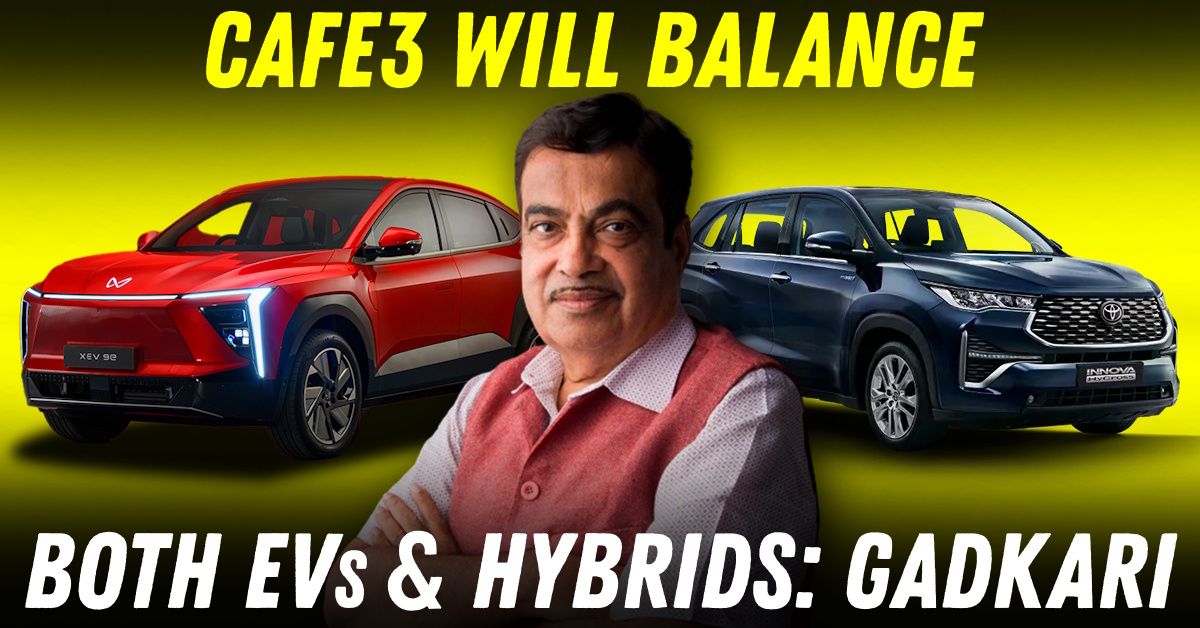CAFÉ 3 Norms Tussle: Has Maruti Suzuki Won the Battle?


India is entering a new phase in its push for cleaner transport. The earlier battle between petrol cars and electric vehicles (EVs) has turned into a three-way contest, with flex fuel vehicles now in the mix. This is not just a minor policy shift. It shows a bigger change in how the government wants to guide India’s shift to cleaner mobility.
Until now, EVs enjoyed a clear edge thanks to the Corporate Average Fuel Efficiency (CAFE) rules, which set fuel-saving goals for carmakers. These rules gave big benefits to companies that made EVs.
But recent statements from Transport Minister Nitin Gadkari suggest a big change. At a recent event, he said, “The old CAFE norms were electric centric. The new CAFE 3 norms will balance both electric and flexi fuel engines.”
This new CAFE 3 framework, due in April 2027, will give flex fuel vehicles, those that run on petrol-ethanol blends, the same regulatory benefits as EVs. Instead of choosing between petrol or electric, carmakers will now also have the flex fuel route.
There’s more to this than just cleaner air. The ethanol economy offers a lifeline to farmers. Ethanol can be made from sugarcane leftovers and crop waste. Over the past eight years, blending ethanol with petrol has earned farmers over ₹40,600 crore. The ethanol economy is already worth ₹20,000 crore and is expected to cross ₹2 lakh crore in the coming years.
If a plant processes 2,000 dry tonnes of sugarcane waste a day, it can produce more than 13 crore litres of ethanol in a year. That’s not only a clean fuel source but also a smart way to reuse farm waste and increase rural incomes without affecting food production.
Even though India is pushing EVs, the charging network is far from ready. Right now, there’s only one public charger for every 135 EVs in India. Globally, this number ranges between one charger for every 6 to 20 EVs. Of the 25,000 EV chargers installed, only 12,100 were working as of February 2024. And most of them are slow chargers that don’t support long-distance travel.
There’s another big issue. Around 90 percent of Indian households don’t have fixed parking, making home charging difficult. Many buyers are still hesitant, mainly because of the fear of running out of charge with no charger in sight. These issues can’t be solved quickly. They need large investments and a change in how people live and travel.
The new CAFE 3 norms are creating friction in the industry. Maruti Suzuki is pushing for easier rules for small cars. But other companies like Tata Motors, Mahindra, MG Motor and Toyota disagree. They’ve already invested heavily in EVs and cleaner technologies and don’t want the rules to be relaxed.
The numbers explain Maruti’s concerns. Sales of its small cars dropped from over 22 lakh units in FY19 to 13.5 lakh units in FY25, a 40 percent fall. Maruti says the current rules are unfair to smaller, fuel-saving cars but allow heavier vehicles to pollute more. Others argue that this is just a way for Maruti to avoid investing in newer, cleaner tech.
Another key concern is jobs. Making EVs can create more jobs in the short term since the shift needs fresh setups and training. But once EV production stabilises, it could cut jobs. Experts say 45 to 84 percent of internal combustion engine parts may become outdated, risking the jobs of millions working in traditional auto plants.
On the other hand, ethanol production could create steady employment. Every 10 crore litres of ethanol can generate around 1,500 jobs, from farming to processing and transport. These jobs matter most in rural areas where work options are already limited.
The government’s mixed strategy also helps avoid overdependence on China. Chinese companies dominate the EV battery supply chain and already enjoy big cost benefits. If India depends only on EVs, it risks becoming too reliant on one country’s tech and supply.
By also promoting flex fuel, India is creating a backup plan. It lets the country develop its own clean fuel path without being held back by global supply issues. This fits with the larger goal of being more self-reliant in technology and reducing imports.
The new policy direction checks many boxes. It supports rural jobs, reduces oil imports, keeps carmakers on their toes, and tackles the China risk. At the same time, it gives the public more choices. EVs are perfect for city users with fixed parking and access to charging. Flex fuel vehicles are easier to run on existing fuel networks and can reach remote areas with little change in infrastructure.
The government has already made E20 fuel, a 20 percent ethanol blend, available across India. This makes flex fuel vehicles more practical and ready for wider use.
The upcoming CAFE 3 rules are not just about cleaner air. They’re about managing India’s shift to greener transport in a way that keeps the economy and people’s livelihoods in mind. By putting EVs and flex fuel vehicles on equal ground, the government is making space for multiple clean mobility paths.
This is also a smart political move. Farming employs nearly half of India’s workforce, and the ethanol programme directly adds money to farmers’ pockets, expected to touch ₹35,000 crore annually by 2025 to 2026.
As April 2027 approaches, car companies will need to plan not just for EVs, but also for this new three-way race. In India, the future of mobility won’t be about one winning tech. It’ll be about choosing the right mix of solutions for different people, places and purposes. And that might just be the smarter way to drive into a cleaner tomorrow. And that might just mean that the country’s biggest car maker, Maruti Suzuki India Limited, might have won the day.